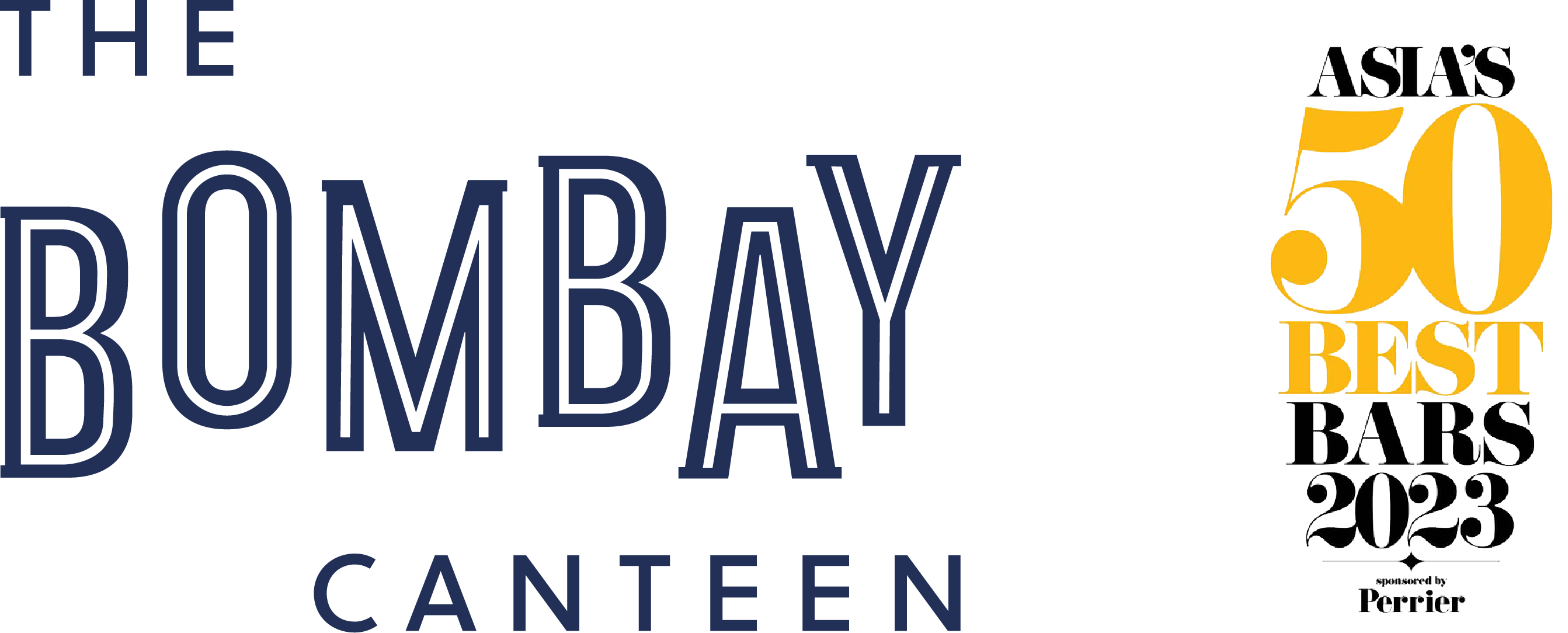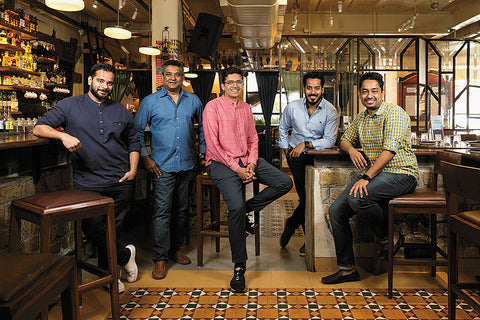Sameer Seth (founder and CEO, The Bombay Canteen) started his career as a banker, but soon realized it wasn’t his true love. When he thought about what made him truly happy, it was his food memories with his family. He started working at a friends’ restaurant in operations and then moved to Cornell University to pursue a masters from the School of Hotel Administration (SHA). That’s where he met Yash Bhanage (founder and COO, The Bombay Canteen), who was an IHM Goa (India) graduate. Sameer and Yash hit it off from the word go. Although they were classmates for only eight months, they always kept in touch. After a couple of stints at various outlets and hotels, Sameer called Yash one fine day and asked, “How long are we going to keep doing this for someone else?” Even though at this point Yash was doing something interesting, subconsciously, he felt that he wasn’t getting any credit for it, really.
It’s then that it all began. Sameer and Yash started discussing ideas and concepts over phone calls. In 2013, Sameer moved back to India and started scouting for locations. They found their dream location in March 2014. The Bombay Canteen opened doors to public on Feb. 11, 2015. It’s an all-day restaurant and bar that’s truly Indian at heart, that toasts the old and celebrates the new in unique and different ways through their food. What has made them the much-loved brand they are, and how did an emerging brand, founded by such young entrepreneurs (Yash is 33 and Sameer is 38), train their employees to take so much pride in their work? Here is their story.
P.S. Sameer was traveling when we went in for this interview, so Yash stepped in to answer for the both of them.
Vasundhara Sawhney: How did you come up with the concept of The Bombay Canteen?
Yash Bhanage: Through all our travels and places our work took us to, Sameer and I realized that people everywhere in the world were going back to their roots (when it came to food) and were trying to revive and make it better. In the U.S. Midwest, they were trying to make BBQs better, and in California, chefs were focusing more on ingredients that went into the food. Here in India, we were still stuck in an era of western food, and Sameer and I saw that as an opportunity. We realized that everyone’s idea of going out for an Indian meal was so clichéd. Even before you reached a restaurant, you knew what you were going to have: butter chicken and chicken tikka masala! The idea was to celebrate India as a whole (not north Indian food and south Indian food) and have a cultural and social context to the food.
It takes a village to run a restaurant. What did it take you?
Truly a village of very very dedicated people. From the beginning we decided that Sameer and my time would be spent wisely and that meant with the employees and with the guests. So, we outsourced finance and the design and branding work. We also have one of the best in food and beverage public relations (PR) manage our PR. Chef Floyd Cardoz, our culinary director and partner, is a celebrated chef and winner of Top Chef Masters. We have Chef Thomas Zacharias who is from Culinary Institute of America (CIA) in New York. Apart from this, we have a fabulous team of employees who take great pride in and ownership of their work. This is very strong team.
You pay a lot of attention to your employees. Was that the intent from the very beginning?
Our philosophy has always been to serve our employees well and they’ll serve the customers better in turn. We spend a lot of time training our team. We wanted to get away from the servile attitude of “Yes sir, no sir” that prevails in Indian restaurants. We wanted to get away from that and have our stewards make more conversations with our customers, so they feel the stewards are on their side, not ours.
We are very proud of the fact that the original management team of seven people, barring one, is still with us today. We try to make sure people are having fun at work. It may sound surprising, but we’re on a five-day work week. That’s unheard of in the restaurant business. We hired employees in excess so we could create the five-day roster accordingly. We try our best not to have break shifts. In 2015, when we opened doors, we were open for dinner only. We started serving just 30 people a day and gradually took that number up so our teams could get comfortable.
Just 30? So you definitely didn’t expect it to take off the way it did. How did you both react to the love you got?
We had always thought that we’d close down the central part of the restaurant for lunch since no one will come here and we’ll save on operating expenses. I mean, we were in an old mill compound that resembled a graveyard. There was nothing else around. But thankfully, we have never had to do that. Sameer and I would often ask each other, “Where are all these people coming from?!” There was a great sense of gratitude that people were loving the concept.
And where were all these people coming from?
Mostly word-of-mouth. I also think we did a great job with social media by understanding what people wanted to see. Our most popular photo wasn’t of anything fancy, but of a Malabar paratha (a layered flatbread) on a plate. That started many conversations on social media, with people talking about how it’s different in different states and how their mothers and grandmothers make it.
What drives you both?
We want to create experiences that guests will enjoy. We don’t believe in cookie-cutter approaches. For example, if you come in the evening, you’ll see a steward walking around with a tray of snacks. You know, in Indian homes, when you go to see someone in the evening, they’ll always bring out the best snacks. We wanted to give our guests that feeling, not in a formal way, but a fun casual way.
What are some of the best memories of the past five years?
Our Independence dawat (meal). Most places in India are shut on Independence Day. And we wanted to do something different. So Sameer came up this great idea of giving back to the community. What we do is join all the tables in a community-style seating and we invite anyone and everyone to come eat with us. I literally go out and call the security guards and the cleaning lady, too. We don’t put any value to the meal and it’s your prerogative to leave money at the table, if you wish to. Whatever money is people leave goes to charity. We’ve done four so far. When we did the first one, we served about 180 people and raised Rs 2 lakhs. Last year we served 650 people and raised Rs 18 lakhs. The best part is that people who came to eat the first two years loved the concept so much that they became volunteers for us in the following years and even helped us cook and serve. The third year, our entire team donated their full month’s tips. And that felt so good. For them, the tips form a big part of their earnings, and to give it all away to charity was so heartwarming.
Any other achievements or milestones you’re proud of?
In 2018, Great Place to Work put us in the best startups to work for and that was great achievement for us. It gave us conviction that we were able to achieve what we set out to do. We hold it very highly. Then, the Condé Nast Traveler magazine awarded us the best restaurant in India in 2018. It was huge especially as we displaced the then number one restaurant, Indian Accent. We’ve looked up to Chef Manish Malhotra and his restaurant, Indian Accent, and to win it over them was incredible. There was also another list that Condé Nast Traveler came out with that included us in the 100 places in the world you must eat. When that happened then there was a realization that this is really big, like we’re getting somewhere. We knew we didn’t want to be a flash in the pan. When we set out, we said we were building this plan for nine years or more. So, once we hit five years this year, it’ll be a realization that it’s really happening.
Do awards really matter?
To me they do because I am a very competitive person. For Sameer and Thomas, they don’t matter that much. But I think awards are very motivating. Especially, when you bring back an award to your team and see how it motivates them and gives them this sense of ownership, this pride about your workplace, that is huge.




Comments (0)
There are no comments for this article. Be the first one to leave a message!